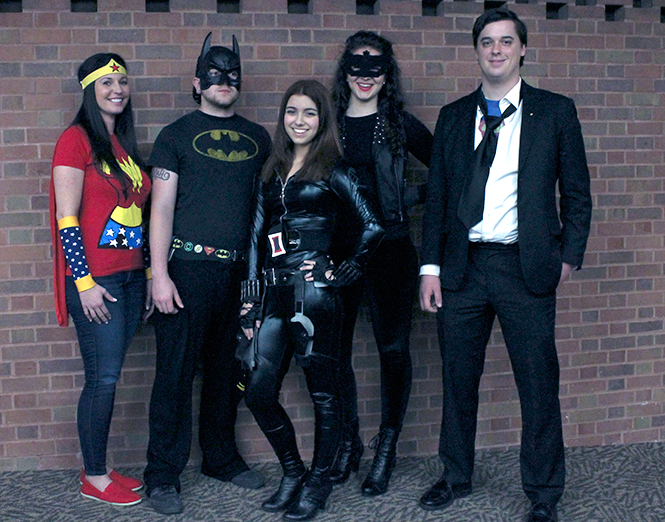Stark History Club debates comic book creators
April 17, 2014
The Kent State Stark History Club hosted its first comic book debate Thursday in the Kent State Stark Main Hall Auditorium.
The event urged its attendees and debaters to look beyond the superficial pop culture world of comic books and find a deeper meaning within the pages, tackling issues from sexuality to questioning life after death.
More than 70 people, some dressed in costume, attended to show their love for Marvel or DC Comics.
Those in attendance were asked to take a vote at the door for whom they believed would win the debate, and they were asked again after closing arguments.
“People will vote when they come in and when the debate is over,” said Christine Bowman, history professor and coordinator of the event. “I want to see if anyone has swayed their vote.”
The end vote also determined who would win the debate.
“Having the audience vote is a way to do that quickly and fairly,” Bowman said.
Bowman urged people to look beyond their favorites and vote based on who they believed made the best intellectual argument.
DC won the coin toss and declined the opportunity to answer first, giving the first question to Marvel. DC started the opening arguments.
“DC’s longevity is not why we prefer their comic universe,” said Stephen Neaderhiser, assistant professor of English and Team DC’s leader. “DC is truly a universe of alternate reality that parallels our own. They may have superheroes, aliens and magic, but they also have history within their universe.”
Angela Saunders, adjunct history professor and Team Marvel’s leader, gave its opening argument.
“Marvel Comics embraces the flaws in human nature, and they allow their characters to embody the best and the worst of human kind,” she said. “They make stupid mistakes, they struggle with moral dilemmas and broken hearts and how to pay the rent. In short, readers can often see themselves in Marvel characters.”
Marvel’s strongest defense throughout the debate was that the characters Marvel creates are just like us, only they can do a little extra.
“Someone like Tony Stark exists in the real world,” Saunders said. “He’s not above humanity, he’s not god, he’s just a guy. And that’s one of the things that has really made Marvel successful.”
While Marvel may have had a compelling argument and won the original vote, DC won the crowd’s vote with its complex arguments and deep understanding of the characters it was presenting.
“Maybe the reader can’t see themselves in the characters,” Neaderhiser said. “What they do offer is the ability to see potential answers to that question that we always have … ‘If I had that power, what would I do?’ ”
DC won the debate by just three votes, totaling 40 to 37.
“It’s interesting to see what these two universes have to offer,” Neaderhiser says. “But we have universes that in some ways don’t require to be compared. There are things that we might see in one universe or the other that we like more, but that does not mean that one is better or worse than the other.”
Contact Hannah Armenta at [email protected].

























